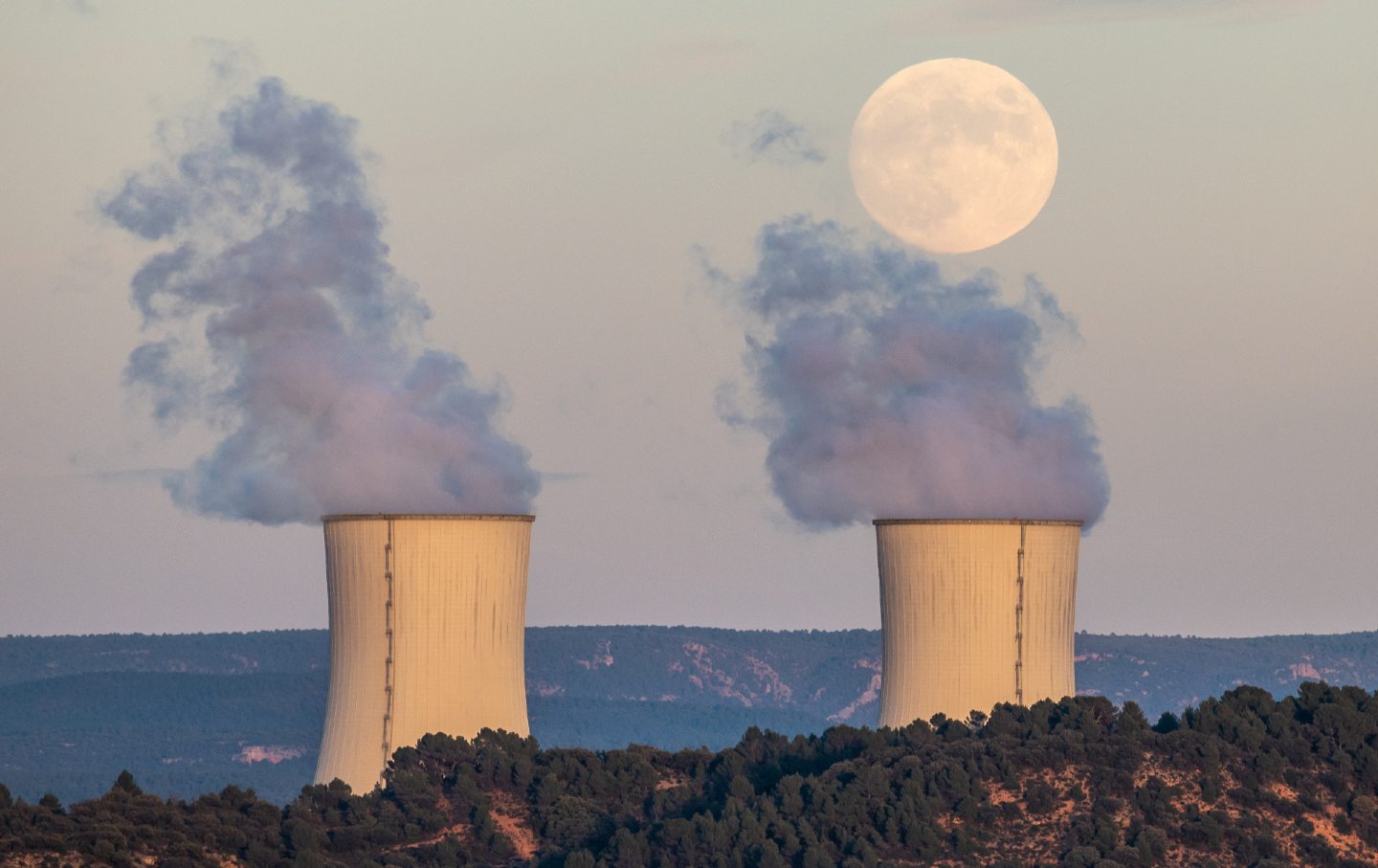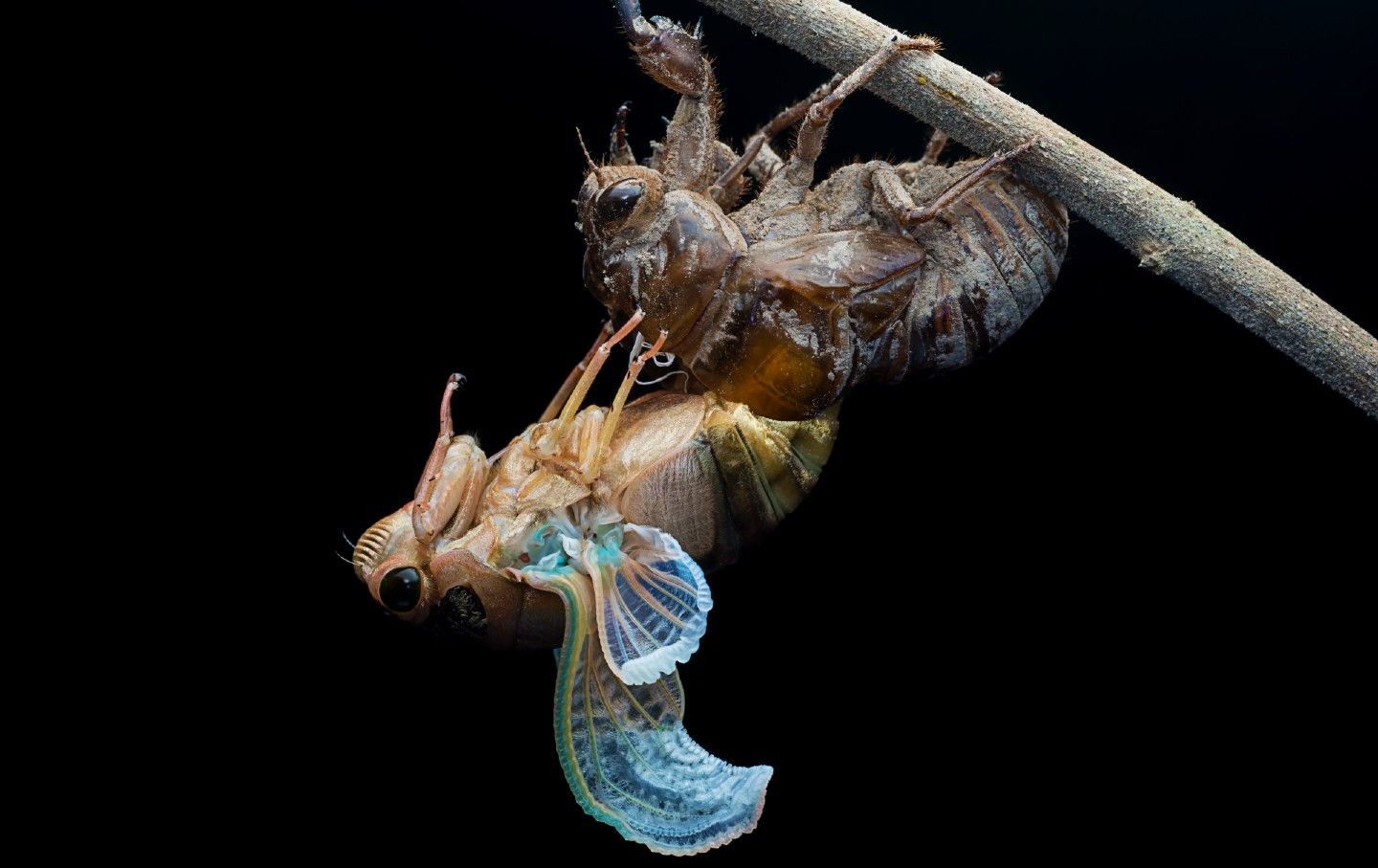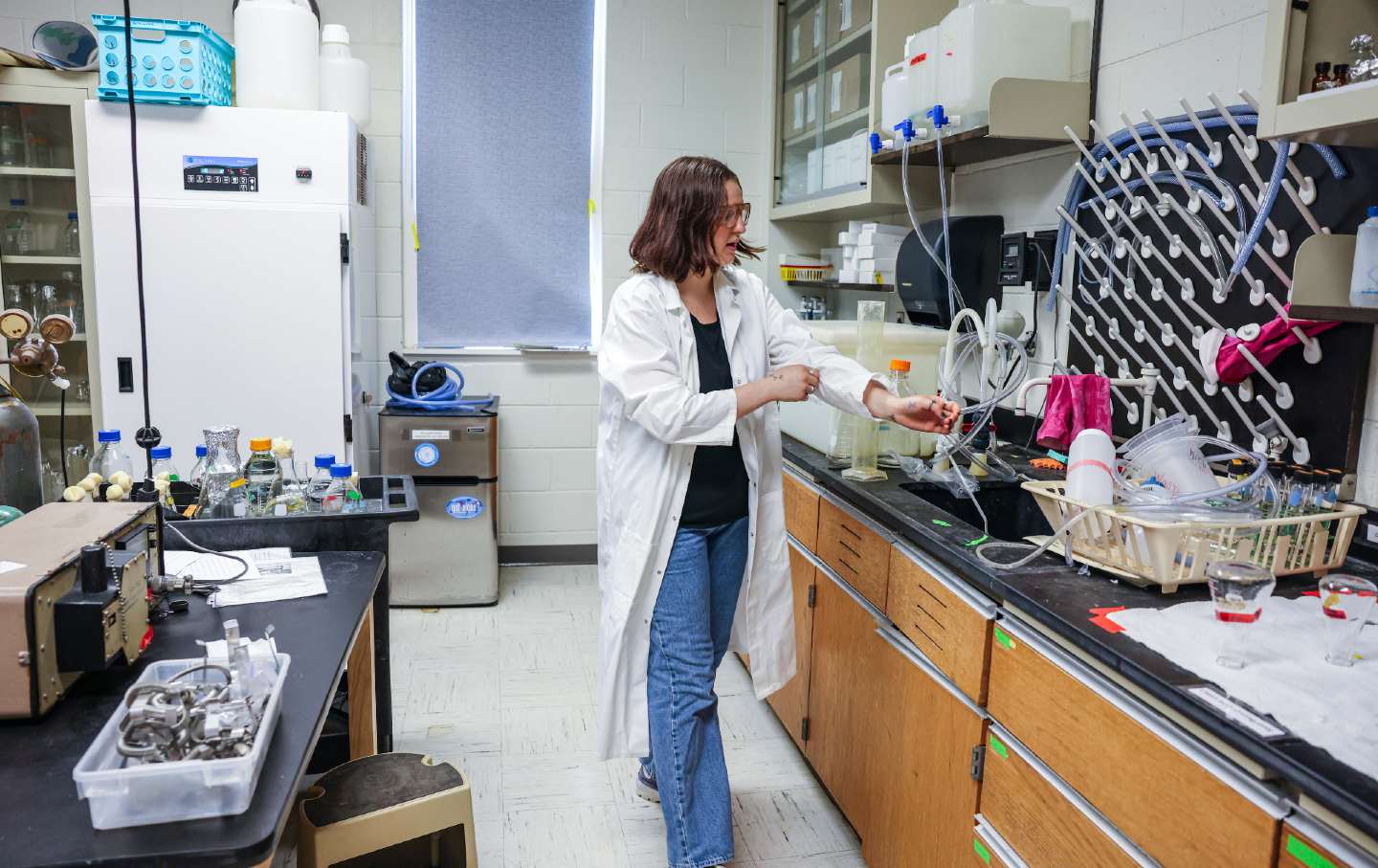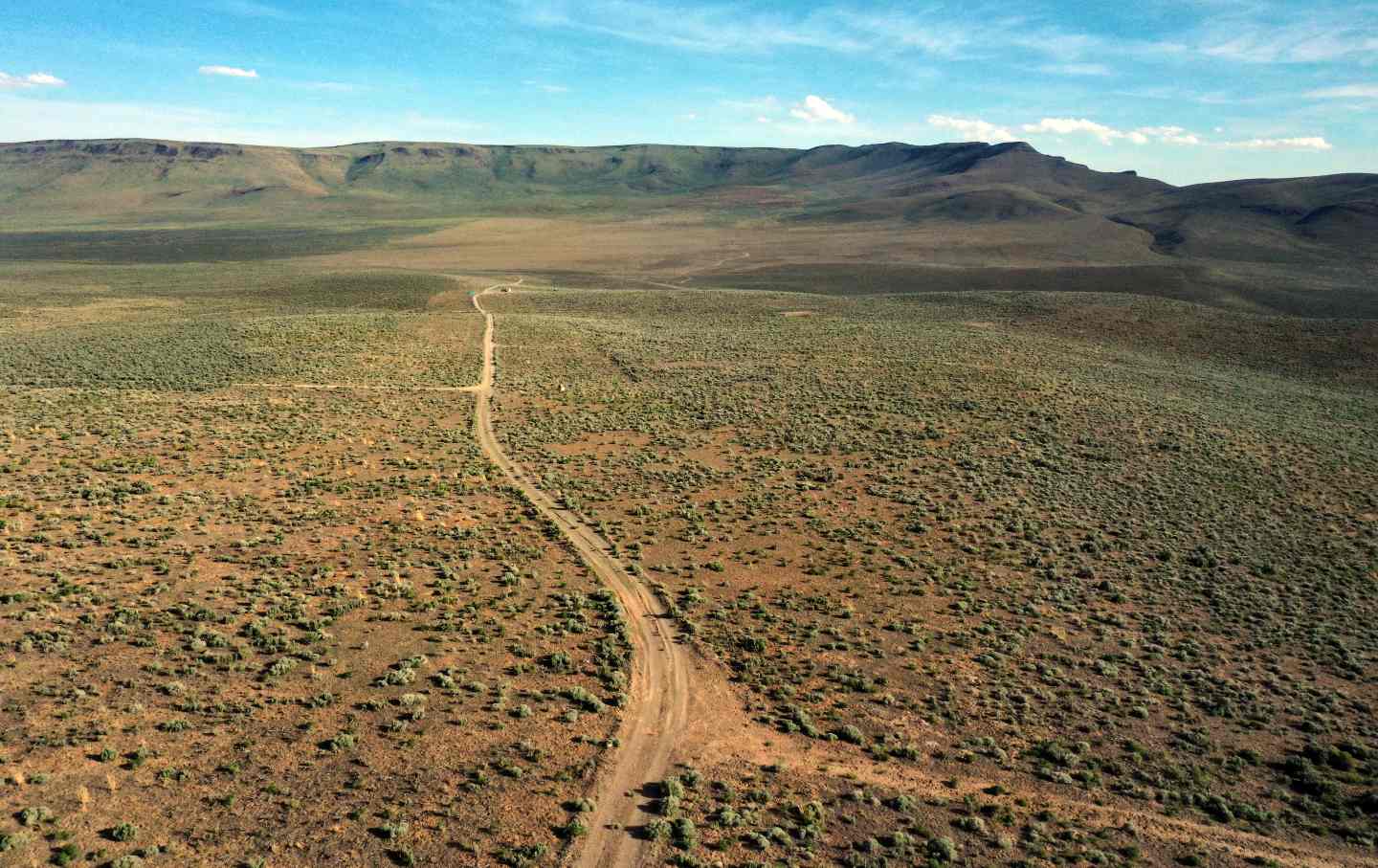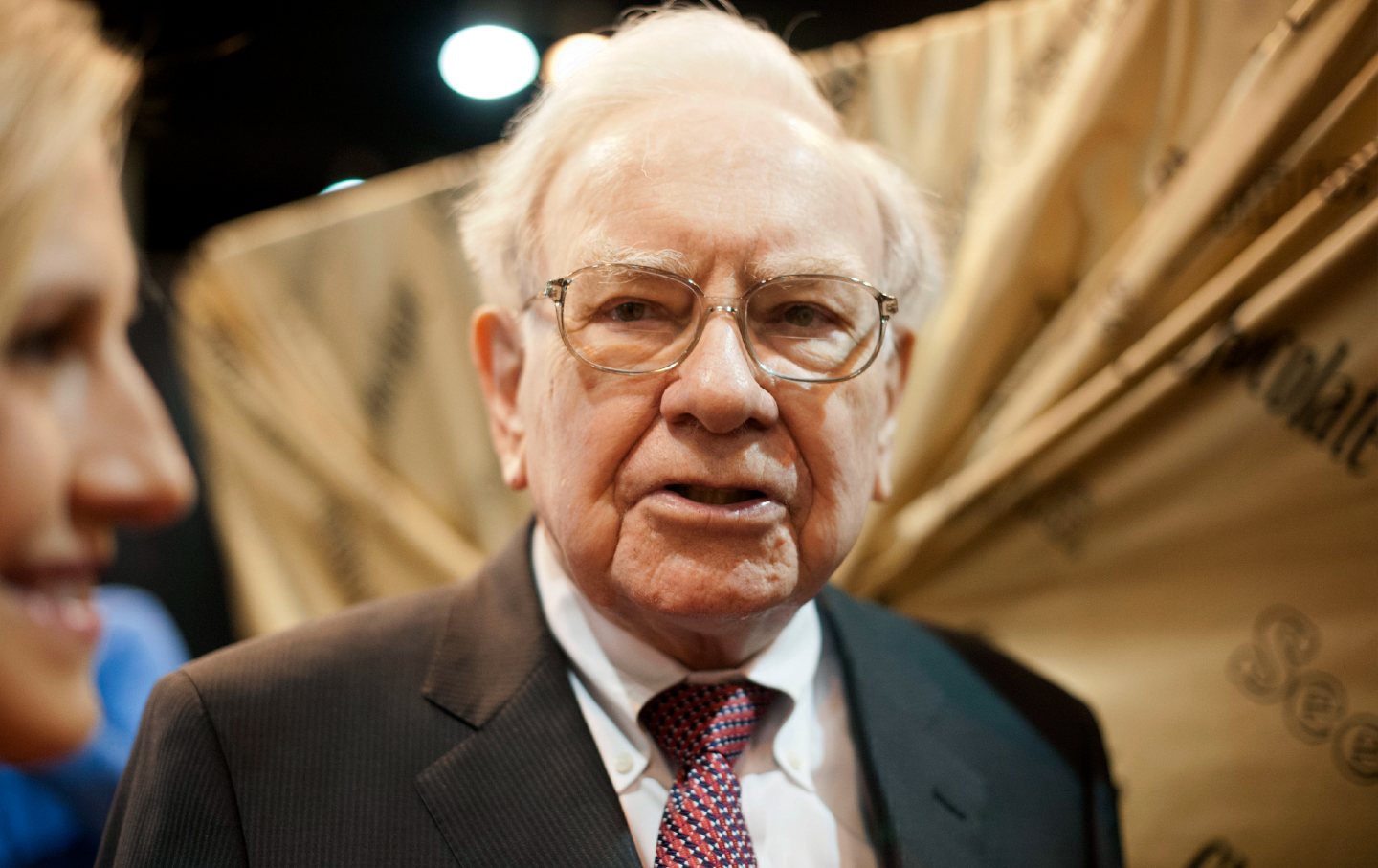The “Dark Joke” of Having a Climate Summit in Azerbaijan
COP29 in Baku reveals the contradictions of having climate negotiations in a petro-state.
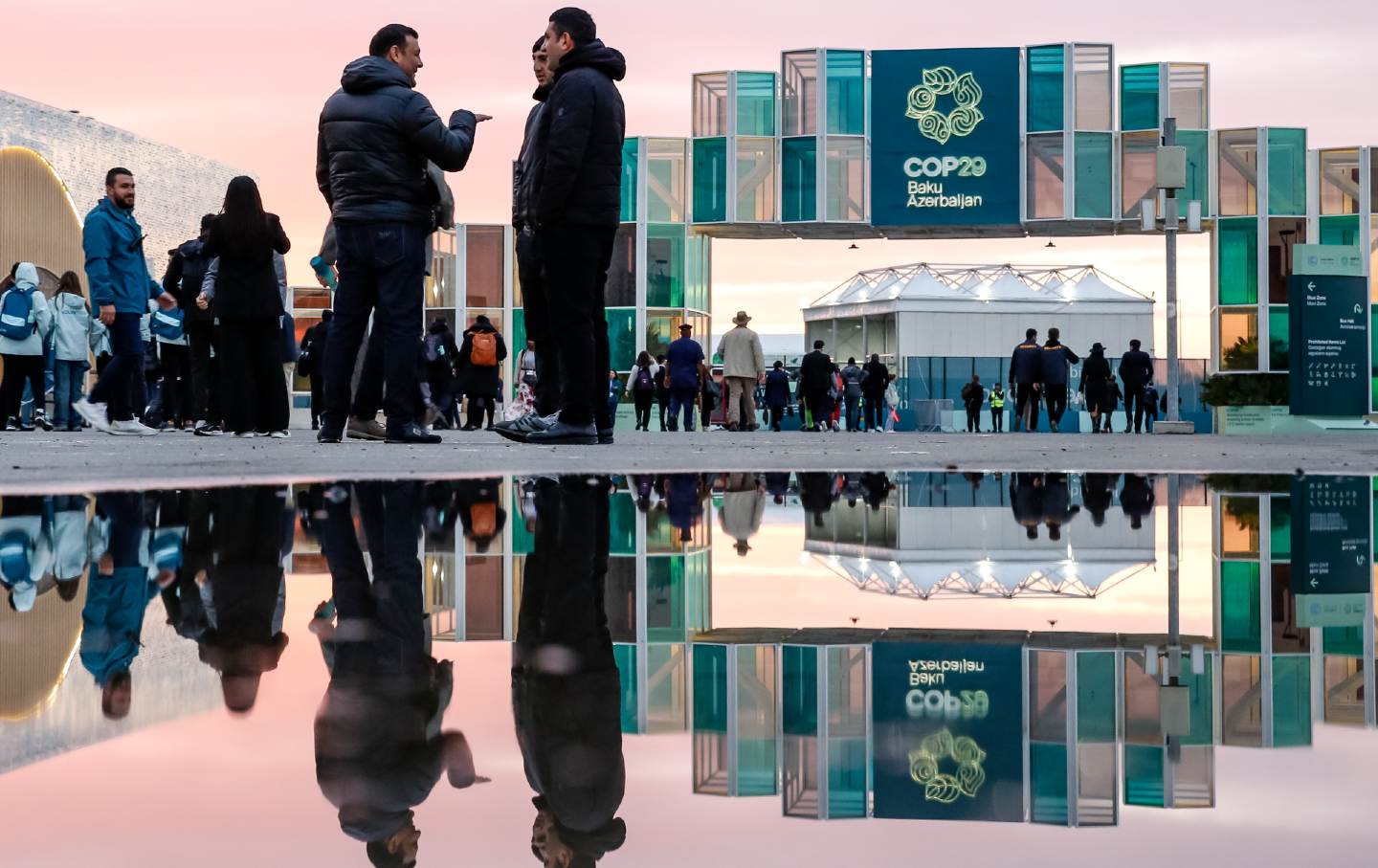
Participants walk and network in front of the main entrance during the United Nations Climate Change Conference COP29 at Baku Olympic Stadium in Baku, Azerbaijan, on November 14.
(Dominika Zarzycka / SOPA Images / LightRocket via Getty Images)
Baku, Azerbaijan—Azerbaijan is the land of fire, or so the Zoroastrian legend goes. Its supply of combustible fuel has long bound this story to Azerbaijan’s reality. One of its natural wonders is a “burning mountain,” Yanar Dagh, which blazes continuously from hydrocarbon gases venting from inside the earth.
With wealth derived from fossil fuel exports, Baku, the country’s capital city, has built gleaming glass towers overlooking the Caspian Sea. On the outskirts of Baku, oil rigs spread for miles along the hills, perpetually bobbing like dunking bird toys. In the western part of the country, crude oil is considered so potent that it is thought to have medicinal properties, and for a relatively modest price (around $20), one can bathe in a vat of it at special spas. It is hardly any wonder that the president of Azerbaijan, Ilham Aliyev, opened COP29 with a speech that said that oil and gas “is a gift of the God.”
Countries should not be blamed “for bringing these resources to the market” Aliyev said. “People need them.”
Aliyev himself made the case that Azerbaijan is misunderstood, denying that his country is a petro-state (oil and gas make up nearly 90 percent of the country’s exports) and claiming that the moniker itself is Western “slander.” This is the second consecutive COP that has been held in a petro-state—last year was in Dubai in the United Arab Emirates—and the third consecutive COP held in an authoritarian country with a history of human-rights abuses (two years ago, COP was in Sharm el Sheik, Egypt). Activists and dissenters have faced crackdowns from the government, while oil and gas barons have been given the red carpet.
Azerbaijan secured the opportunity to host this year’s COP largely through some geopolitical maneuvering. The event’s regional rotation placed Eastern Europe in line for 2024, but Russia, in opposition to the West and using its veto power, rejected any European Union country as host. This created an opening for Azerbaijan, which sealed the bid with an unusual alliance: Armenia, its longtime adversary and opponent in the Nagorno-Karabagh territorial dispute that only formally ended this past September, backed Baku’s candidacy in exchange for the release of prisoners. This year’s COP has seen increased Russian participation.
In Baku, the atmosphere has been welcoming, friendly, and kind, which is in part a genuine feature of Azerbaijani culture and in part the effect of a dictator building a kind of Potemkin diplomacy. From the moment conference attendees land at the Baku airport, there are smiling, young, English-speaking people in baby-blue vests looking to shepherd them around the city. As you drive into Baku and along the wide Soviet-built boulevards, Azerbaijani flags hang along private balconies in uniform rows and lines that seem impossible to have appeared out of organic patriotism. The facades of Ottoman-style homes in the charming old city have been beautifully illuminated with new lighting, while the interior of the homes crumble. Shops in the walled medieval old town have been ordered to stay open late into the night to promote a sense of hospitality and the impression of a robust economy. One carpet seller, who asked not to be named, said that he normally works four hours a day four days a week, dealing with requests directly from clients. But he is pressured to stay open until 11 pm or even midnight throughout the conference. “It’s a decision that came from high above,” he said. “And we accept it. It is a Soviet mentality.”
The independent watchdog organization Freedom House ranks Azerbaijan as the least democratic state in Europe, with its long history of war crimes and of targeting journalists, political opponents, and human rights defenders. In a report released by Human Rights Watch, more than 33 cases of arbitrary or bogus criminal charges against activists and NGOs were found in the lead-up to this year’s conference. In 20 of those cases, individuals were charged with smuggling money into the country, and all 20 either worked for or were involved with unregistered NGOs and the two independent media outlets in Azerbaijan. Greta Thunberg, the young climate activist, boycotted COP this year, citing its locale some kind of “dark joke.”
All of this contributes to a feeling of twisted irony at COP. Although a petro-state host does not necessarily mean the abandonment of climate goals, they may mean a softening of the tactics many activists and experts believe are necessary to address the climate crisis. Consider last year’s COP president in Dubai, the UAE’s Sultan Al Jaber, who heads both the Abu Dhabi National Oil Company and the Abu Dhabi Future Energy Company, a renewable energy company he founded. While his closing statements produced a milestone commitment to “transitioning away from fossil fuels,” it was also a softening of the “phase-out” language used at previous COPs. He also said during the conference that there was “no science” that indicated that a phase-out of fossil fuels is needed to avoid surpassing global heating limits.
Popular
“swipe left below to view more authors”Swipe →Nevertheless, an open letter from more than 20 experts and climate leaders that was released at the end of the conference’s first week said that COP has lost its way. “It is now clear that the COP is no longer fit for purpose” the letter said. “Its current structure simply cannot deliver the change at exponential speed and scale, which is essential to ensure a safe climate landing for humanity.”
Activists have also reportedly felt stifled at the conference with their protests confined to a few limited spaces in the entrance hall. Demonstrations are often extremely brief and are cleared soon after they are over. Attending the summit, it seems as if the activism and protest outside of the conference center have been nonexistent. Prior to the conference, Azerbaijan arrested more than two dozen journalists and activists.
This COP is being billed as the “finance COP,” and countries have been given the mandate of setting a new global finance goal this year as well as being expected to submit strong national climate commitments, known as Nationally Determined Contributions. But major heads of state have opted to skip this COP. European Commission President Ursula von der Leyen, French President Emmanuel Macron, German Chancellor Olaf Scholz, China’s President Xi Jinping, and US President Joe Biden are all choosing not to attend.
The United States’ absence looms large in the realm of sustained climate financing. As the world’s largest economy and one of its top carbon emitters, its participation carries weight. Were the US to firmly plant its foot on the path to climate action, the financial tremors would ripple across the globe.
Activists like Jacob Maurice Johns, a Hopi and Akimel O’odham community organizer from Spokane, Washington, have been particularly disappointed in the United States’ lack of participation in achieving climate finance goals, especially in light of Donald Trump’s return to office. “Biden has had opportunities to make great strides toward climate justice over the last four years, and he has failed us over and over. Now Trump will likely take us out of the Paris agreements,” he said. “I just hope that the rest of the world can take advantage of the space that is left behind by the United States imploding from the inside.”
Smaller nations have dropped out in protest.,as Papua New Guinean Prime Minister James Marape pulled out of the conference to protest the limited support that big nations have given to victims of climate change. Marape said his country is taking a stance for all small island nations. Papua New Guinean Foreign Affairs Minister Justin Tckatchenko also said that they would be withdrawing from high-level talks, describing the conference as a “total waste of time.”
This is a smaller COP than last year’s summit in Dubai, and it is the first time in seven years that a COP is not larger than its previous year. Some 84,000 people attended COP28 in Dubai, while this year some 65,000 participants have registered. And a larger proportion of fossil fuel lobbyists have been given the VIP treatment than at earlier COPs. The Guardian reported from data collected by the Kick Big Polluters Out activist coalition that at least 1,773 coal, oil, and gas lobbyists were granted access to COP29, while at least 132 oil and gas company senior executives were granted the coveted badges distributed only for guests of Azerbaijan’s president.
Monday marked the halfway point of COP29, the annual United Nations climate summit that has attracted world leaders to address the climate crisis since it began in Berlin in 1995. Simon Stiell, the UN climate chief, told delegates at the conference to “cut the theatrics and get down to the real business this week.”
But COP29 in Baku has exposed a contradiction. A summit meant to lead the global fight against fossil fuel dependence is being held in a nation whose wealth and power are rooted in hydrocarbons. This is a symbol of the deep entrenchment of fossil fuels in global politics. As major nations and activists pull away from a conference they see as co-opted by petro-interests, trust in COP as a meaningful force for climate action dims. Moving forward, COP faces a dilemma as it tries to lead the charge against fossil fuels while warming its hands at its flames.

